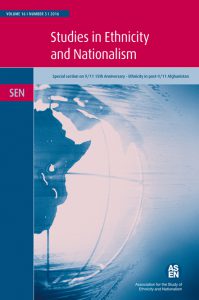The Sociology Classroom: Critical, Transformative, Radical? Part 1 in a Series.
Source: Luiz Carlos Cappellano (Own work) [Public domain], via Wikimedia Commons.
[This article is the first in a series that explores theories behind critical/ radical/ transformative education in the sociology classroom, as well as its practice, problems, limits, and the constraints faced by sociology teachers committed to critical pedagogies. This first article introduces some theories behind critical pedagogy, and its overall framework.]
Many of the authors debating radical or critical pedagogy agree that a truly transformative educational approach should go beyond an education for critical thinking, instead emphasizing the notion of social change. How exactly pedagogy can – or should contribute – to radical social transformation, however, is highly contested.
Sweet (1998) argues that the content taught in the sociology classroom often explicitly contradicts the very modes of instruction. Drawing on Freirean pedagogy, he understands radical pedagogy as one that redefines “the teacher-student relationship in such a way as to mirror and facilitate the creation of the idealized social relationships asserted by radical theory” (101). In other words, classrooms are supposed to be structured in ways that are coherent with social utopias, and as a spaces where the groundwork for change toward a new society is laid. Based on this understanding of radical pedagogy, Sweet embraces three goals proposed by Freire: Students are supposed to 1) recognize their oppression, 2) understand the grounds for their oppression and 3) engage in practices to counter that oppression. He translates these goals into four classroom prescriptions: According to his approach, radical pedagogy means a) not testing or grading in the traditional fashion, b) reducing the power imbalance between students and instructors, c) favoring dialogue over lectures and d) encouraging activism and incorporating it into the class. According to these criteria, Sweet concludes, only a small minority of sociology teachers engage in radical pedagogy, whereas the majority favors more traditional pedagogies.
Fobes and Kaufman’s (2008) conception of critical pedagogies, similarly, emphasizes the trajectory toward social change and incorporates both aspects of transformative and student-centered education. According to them, critical pedagogy can be defined according to the same four principles: It strives for eliminating the teacher student binary, establishes a problem-solving dialogue, it fosters curiosity (in both the instructor and the student) and it encourages and enables praxis.
There are, of course, practical considerations and challenges – and potential remedies – that may arise in the classroom of teachers committed to critical pedagogy. First of all, challenges revolving around student behavior may concern the fact that students have lost their voices because of a top-down education system and thus critical dialogue may be inhibited at first. At the same time, some students may explicitly reject the progressive politics and the encouragement for social action inherent in critical pedagogy because of conservative leanings. Fobes/ Kaufman suggest that framing education as an active – and thereby inherently non-neutral – activity can encourage students to overcome these barriers. Concerning the possibility of reconfiguring the teacher student binary – probably the most significant challenge – they also argue that teachers can create a space for students to actively participate in the forming of classroom rules and thus take ownership of the class. For instance, students can be invited to be involved in deciding on course readings, due dates and requirements for course projects, and even co-develop grading frameworks or engage in peer grading.
These pedagogical projects certainly come with constraints and specific problems, such as the danger of concealing the power dynamic inherent in the teacher student relationship, the challenge of encouraging students to take on active ownerships of the classroom, fundamental political disagreements between professors and students, as well as institutional constraints that may impact career opportunities for sociology teachers. Moreover, even among sociologists committed to radical or critical projects, these Freirean influenced student-centered approaches do not go unchallenged and other academics have developed radical critiques of these apparently radical approaches. All of these issues will be discussed in future articles at Sociology Lens. Stay tuned.
FURTHER READING:
bell hooks. 1994. Teaching to Transgress. Education as the Practice of Freedom. New York: Routledge.
Freire, Paulo. 2007. Pedagogy of the Oppressed. New York: Continuum.
Sweet, Stephen. 1998. Reassessing Radical Pedagogy, Teaching Sociology 26(2): 127 – 129.





1530-2415/asset/SPSSI_logo_small.jpg?v=1&s=703d32c0889a30426e5264b94ce9ad387c90c2e0)
1540-6210/asset/society_affiliation_image.gif?v=1&s=812a48e1b22880cc84f94f210b57b44da3ec16f9)